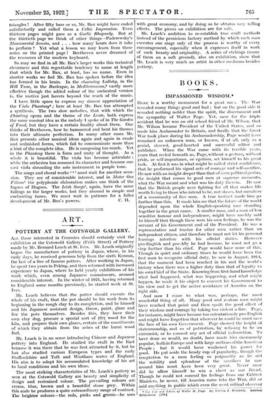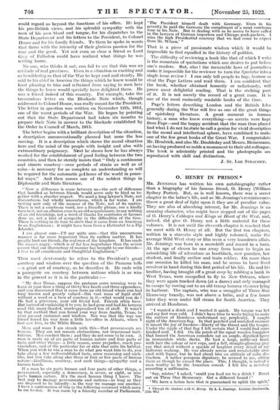BOOKS.
IMPASSIONED WISDOM.* HERE is a worthy monument for a great ma7i. Th War revealed many things good and bad ; but on the good side it revealed nothing nobler than the spirit, the discernment and the sympathy of Walter Page. Yet, save fur the triple accident that he was an old school friend of Mr. Wilson, that Mr. Wilson became President of the United States, and so made him Ambassador to Britain, and finally that the Great War took place during his Ambassadorship, Page would have remained an unknown man, or known, if at all, only as a genial, shrewd, good-hearted and successful editor and publisher. When the War came with its terrible years, years that reeled beneath us, Page, without a gesture, without pride, or self-importance, or egotism, set himself to his great task. At first it was in what might be called strict confidence, that he performed his signal acts of courage and self-sacrifice. He saw with an insight deeper than that of mere political genius, the insight that comes to good men at supreme moments, what the War meant and what was his duty therein. Ile saw that the British people were fighting for all that makes life worth living to those who intend to be, not slaves, but members of a community of free men. A true instinct made him go further than this. It made him see that the future of the world depended upon the whole English-speaking race standing together in the great cause. A smaller man, and a man of less sensitive honour and independence, might have meekly said to himself that though these were his own feelings, he was the servant of his Government and of the President. lie was a representative and trustee for other men rather than an independent citizen, and therefore he must not let his personal leanings interfere with his official duties. However pro-English and pro-Ally he had become, he must not go a step further than his chief. Page would have none of this. Though in quiet and ordinary times he would have been the first man to recognize official duty, he saw in August, 1914, that the moment had been reached in his and the world's history when there was a higher duty than that of loyalty to his own Chief of the State. Knowing from first-hand knowledge what had happened, what was happening, and what might happen, lie made it his object to convert his Government to his view and to get the active assistance of America on the right side.
And now I come to what was, perhaps, the most wonderful thing of all. Many good and zealous men might have reached that point and then spoilt the good effect of their wisdom and courage by taking too violent a line. Page, for instance, might have become too ostentatiously pro-English and might have forgotten that wherever he could he must save the face of his own Government. Page showed the height of statesmanship, and so of patriotism, by refusing to be an extremist, or to commit any act of official indiscretion. To have done so would, no doubt, have made him enormously popular, both in Europe and with large sections of the American People ; but it would have weakened his power for good. He put aside the heady cup of popularity, though the temptation to a man feeling so poignantly as he did the nobility and splendour of the sacrifices he saw around him must have been very great.. Never once did he allow himself to win a cheer as our friend. Though he could not conceal his feelings from our Cabinet Ministers, lie never, till America came into the War, did or said anything in public which even the most critical observer • The 1.;fe and betters at Waller U. Page. By Lurtoa 1. Hendrick. London: Heinemann. WO
could regard as beyond the functions of his office. He kept his pro-British views, and his splendid sympathy with the men of his own blood and tongue, for his dispatches to the State Department and his letters to the President, to Colonel House and for his family friends. To them he spoke in words that flame with the intensity of their glorious passion for the true and the good. Yet not even so close a friend as Lord Grey of Fallodon could have realized what things he was writing home.
No one, who thinks it out, can fail to see that this was an attitude of real greatness. Even in a situation so exciting and so bewildering as that of the War he kept cool and steady. He said to his chief in America the things which he knew would be least pleasing to him and refrained from saying to men here the things he knew would specially have delighted them. He was a friend indeed of this country. For example, take the tremendous letter on the Blockade Note which, though addressed to Colonel House, was really meant for the President. The letter in question was written on November 12th, 1915, one of the worst periods of the War. He began by pointing out that the State Department had taken six months to prepare their Note in answer to the blockade established by the Order in Council of March, 1915.
The letter begins with a brilliant description of the situation, a description unconventionally planned but none the less moving. It is a description which shows the moral situation here and the mind of the people with insight and also with extraordinary poignancy. Next he shows how he has always worked for the establishment of good feeling between the two countries, and then he sternly insists that " Only a continuous and sincere courtesy—over periods of strain as well as of calm—is necessary for as complete an understanding as will be required for the automatic guidance of the world in peace- ful ways." And then comes one of the noblest things in Diplomatic and State literature.
" Now a difference is come between us—the sort of difference that handled as between friends would serve only to bind us to- gether with a sturdier respect. We send a long lawyer's Note, not discourteous but wholly uncourteous, which is far worse. I am writing now only of the manner of the Note, not of its matter. There is not a courteous word, nor a friendly phrase, nor a kindly turn in it, not an allusion even to an old acquaintance, to say nothing of an old friendship, not a word of thanks for courtesies or favours done us, not a hint of sympathy in the difficulties of the time. There is nothing in its tone to show that it came from an American to an Englishman ; it might have been from a Hottentot to a Fiji Islander.
I am almost sure—I'll say quite sure—that this uncourteous manner is far more important than its endless matter. It has greatly hurt our friends, the real men of the kingdom. It has made the masses angry—which is of far less importance than the severe sorrow that our discourtesy of manner has brought to our friends— I fear to all considerate and thoughtful Englishmen." •
Then most dexterously he refers to the President's great
courtesy and wisdom over the question of the Panama tolls —a great act of courtesy, as he describes it. He ends with a panegyric on courtesy between nations which is as wise in the general as it is in the particular :—
" My dear House, suppose the postman some morning were to leave at your door a thing of thirty-five heads and three appendices, and you discovered that it came from an old friend whom you had long known and greatly valued—this vast mass of legal stuff, without a word or a turn of courtesy in it—what would you do ? He had a grievance, your old friend had. Friends often have. But instead of explaining it to you, he had gone and had his lawyers send this many-headed, much-appendieed ton of stuff. It wasn't by that method that you found your way from Austin, Texas, to your present eminence and wisdom. Nor was that the way our friend found his way from a little law-office in Atlanta, where I first saw him, to the White House.
More and more I am struck with this—that governments are human. They are not remote abstractions, nor impersonal insti- tutions. Men conduct them ; and they do not cease to be men. A man is made up of six parts of human nature and four parts of facts and other things—a little reason, some prejudice, much pro- vincialism, and of the particular fur or skin that suits his habitat. When you wish to win a man to do what you want him to do, you take along a few well-established facts, some reasoning and such- like, but you take along also three or four or five parts of human nature—kindliness, courtesy, and such things—sympathy and a human touch.
If a man be six parts human and four parts of other things, a government, especially a democracy, is seven, or eight, or nine parts human nature. It's the most human thing I know. The best way to manage governments and nations—so long as they arc disposed to be friendly—is the way we manage one another. I have a confirmation of this in the following comment which came to me to-day. It was made by a friendly member of Parliament. The President himself dealt with Germany. Even in his severity he paid the Germans the compliment of a most courteous tone in his Note. But in dealing with us he seems to have called in the lawyers of German importers and Chicago pork-packers. I miss the high Presidential courtesy that we had come to expect from Mr. Wilson.' "
That is a piece of passionate wisdom which it would be impossible to find equalled in the history of politics.
The difficulty of reviewing a book like that of which I write is the mountain of quotations which one desires to put before one's readers: But, alas the inexorable laws of journalism make it impossible for the reviewer to turn the Spectator into a single issue review I can only tell people to buy, borrow or steal the Page Letters and read them. I am confident that the book, whether obtained honestly or nefariously, will prove most delightful reach 0.. That is the striking part of it. It is not merely the record of a great man. It is one of the most eminently readable books of the time.
Page's letters describing London and the British Isles generally during the War will live as one of the great things of epistolary literature. A great moment in human history, a man who knew everything—no secrets were kept from Page—and the happy accident that the man thus placed had what I do not hesitate to call a genius for vivid description in the moral and intellectual sphere, have combined to make one of the few great books of the Great War. I congratulate Mr. Hendrick, and also Mr. Doubleday and Messrs. Heinemann, on having produced so noble a monument to their old colleague. The book is admirably printed and the photographs are reproduced with skill and distinction.
J. ST. LOE STRACHEY.











































 Previous page
Previous page